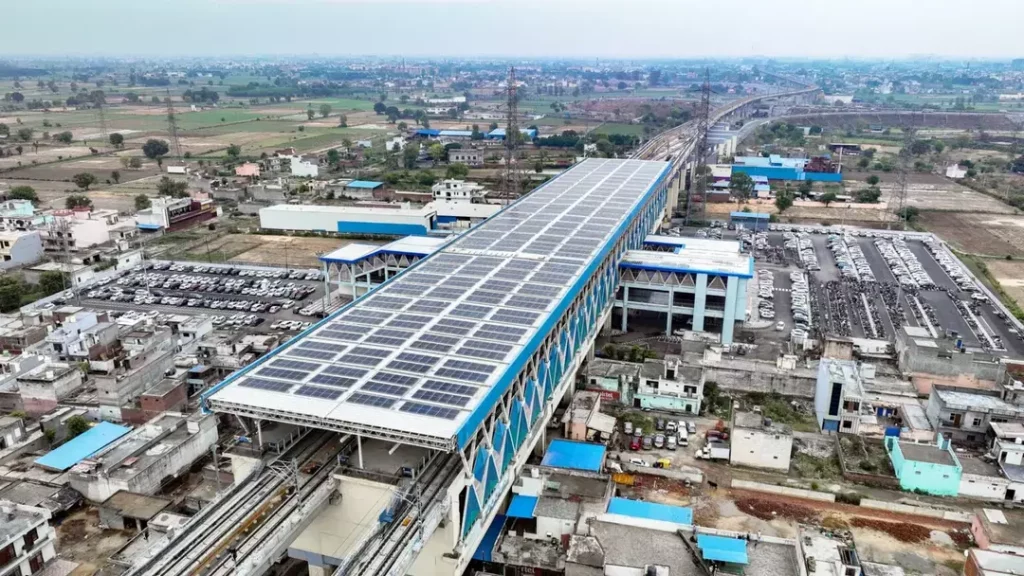
Rooftop Solar Power Plant Installed at Meerut South RRTS Station
In a significant step towards reducing its carbon footprint, the National Capital Region Transport Corporation (NCRTC) has installed a rooftop solar power plant at the Meerut South station of the Delhi-Meerut RRTS (Rapid Rail Transit System) Project. This ambitious project aims to transform NCRTC’s stations, depots, and substations into centers for solar energy generation, thereby lowering the corporation’s environmental impact.
The Meerut South station, one of the key stations on the Delhi-Meerut RRTS corridor, has been equipped with a rooftop solar power plant that can generate 1.4 MW of electricity. This is a significant milestone in NCRTC’s efforts to reduce its dependence on non-renewable energy sources and move towards a more sustainable future. The installation of this solar power plant is expected to reduce the station’s energy consumption by a substantial amount, thereby decreasing its carbon footprint.
NCRTC’s vision is to make its stations, depots, and substations self-sufficient in terms of energy generation. The corporation plans to install solar power plants at all its major stations and facilities, with the aim of generating a significant portion of its energy requirements from renewable sources. This is a bold initiative that not only contributes to reducing the corporation’s environmental impact but also serves as a model for other organizations and industries to follow.
The Delhi-Meerut RRTS Project is a 82.5 km long corridor that connects the national capital with the city of Meerut in Uttar Pradesh. The corridor has been designed to reduce travel time between the two cities, with the journey expected to take just 60 minutes. The project is expected to reduce congestion on the roads, decrease pollution, and improve the overall quality of life in the region.
The installation of the rooftop solar power plant at the Meerut South station is a significant step towards achieving these goals. The plant is expected to generate enough electricity to power the station’s lighting, ventilation, and other essential systems, reducing the need for non-renewable energy sources. This not only reduces the station’s carbon footprint but also helps to reduce its energy costs.
NCRTC has been at the forefront of innovation in the transportation sector, and the installation of the rooftop solar power plant at the Meerut South station is just the latest example of its commitment to sustainability. The corporation has been working tirelessly to reduce its environmental impact, and this initiative is a significant step towards achieving that goal.
The Meerut South station’s rooftop solar power plant is equipped with high-efficiency solar panels that can generate electricity even on cloudy days. The plant is designed to be maintenance-free, with built-in monitoring systems that track its performance and ensure that any issues are quickly addressed.
The installation of the rooftop solar power plant at the Meerut South station is a testament to NCRTC’s commitment to sustainability and its vision for a cleaner, greener future. As the corporation continues to expand its network and improve its services, it is essential that it prioritizes sustainability and reduces its environmental impact.
In conclusion, the installation of a rooftop solar power plant at the Meerut South station of the Delhi-Meerut RRTS Project is a significant step towards reducing NCRTC’s carbon footprint and promoting sustainability. This initiative sets a new standard for the transportation sector, and it is essential that other organizations and industries follow suit. As we move towards a more sustainable future, it is crucial that we prioritize renewable energy sources and reduce our dependence on non-renewable energy sources.
Source: https://metrorailnews.in/solar-power-plant-at-meerut-south-rrts-station/






